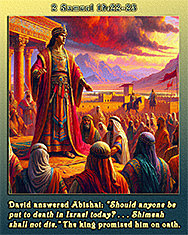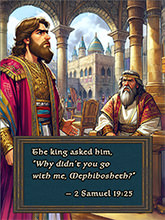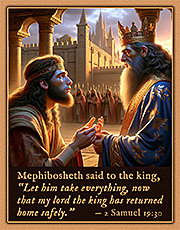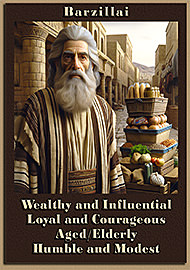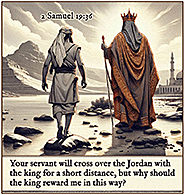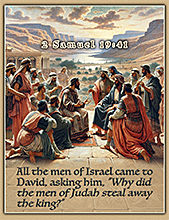2 Samuel 19:22–43 . . . Bible Study Summary with Videos and Questions
“David’s Kindness to His Subjects”
We’re now halfway through chapter 19. Before we read the text of the second half of this chapter, we must review key elements of the first half. The only thing the Israelite people could do after Absalom had fallen was to return to their former king (2 Sam. 19:11–12). Because Absalom had found his strongest support among the people of Judah, David didn’t want the Judahites to conclude that, by supporting Absalom, they’d become his enemies. So he extended amnesty to them, informing them that he still regarded them as his closest kin. This wise political move helped unite the nation again.
David also forgave the Benjamites who’d hoped for his downfall. They’d seen it as punishment for his having taken Saul’s place on the throne. Of the Benjamites, Shimei had actively opposed David, Ziba had apparently misled him, and Mephibosheth hadn’t supported him; his failure to trim his toenails and beard and to wash his clothes were an expression of his grief, resulting in his remaining ceremonially unclean during David’s exile. By forgiving all of the Benjamites, David again secured the support of that difficult tribe.
Seeing Shimei fall prostrate before him (19:18), King David realized that Shimei showed a remarkably humble, contrite confession. He’d sinned significantly against David; he then repented greatly before him, not only in words but in action. Today we’ll see how David will respond to Shimei’s repentant confession.
[Note: Click the link to This Week’s Passage near the bottom of this page to read today’s Scripture.]
Shimei Confesses to King David (2 Samuel 19:22–23)
Shimei was no stranger to David. He was the descendant of Saul who harassed David when he fled from Jerusalem (16:5–13). He hurled rocks, dirt, accusations, and insults at David who spared his life, showing forgiveness to the man who’d formerly cursed him bitterly. Baptist preacher Charles Spurgeon (1834–1892) spoke this of him: Perhaps you have been like Shimei, who cursed king David, and you are afraid that Jesus will never forgive you. But David forgave Shimei, and Jesus is ready to forgive you. He delighted in mercy. I do believe that the harps of heaven never give to Christ such happiness as he has when he forgives the ungodly, and saith, “Thy sins are forgiven; go in peace.” Seeing David ask Shimei, “Don’t I know that today I am king over Israel?” shows that David could readily forgive a man who deserved to die because David was secure, knowing that God gave him the throne. Insecurity motivates revenge and one’s holding on to bitterness.
Abishai then wanted to shut this man’s mouth permanently but David refused, assuming that God was, in some way, rebuking him through this loudmouth. Now, on his return, David had to pass through Bahurim, Shimei’s hometown. Shimei knew he was in serious trouble. David was once again Israel’s king; he reasonably viewed Shimei as a traitor who needed to be removed.
So Shimei came, apparently convicted of his folly and sin, eager to demonstrate his repentance to David by seeking forgiveness. With him he brought 1,000 Benjamites who also expressed their submission to David as their king. Shimei didn’t beat around the bush; he confessed his sin and folly, pleading for David’s forgiveness.
Once again, Abishai expressed his wish to execute this trouble-maker, to be rid of him once for all. But David refused Abishai once again, rebuking not only him but his brother, Joab (who was obviously behind him in his intended execution — note “O sons [plural] of Zeruiah” in v. 22). This was a day of reconciliation. There’d be no executions, even though Shimei deserved to die because he’d cursed the ruler of the people (see Exodus 22:28). Fortunately or Shimei, David assured him, “You shall not die” (v. 23).
How David Will Deal with Ziba and Mephibosheth (vv. 24–30)
When David first became king of Israel, he wanted to fulfill his covenant with Jonathan. So he began to search for any descendants of Saul and Jonathan. He was told about Ziba, a servant of Saul until his death. Summoned to David, Ziba told the king about one surviving son, Mephibosheth, who’d been crippled since childhood. David sent for Mephibosheth, gave him all the properties that had belonged to Saul, as well as Ziba and his household to be his servants. In addition, David had Mephibosheth sit at his table as a son. When David fled from Jerusalem, Ziba met him on the way with provisions for the trip. When David asked about Mephibosheth, Ziba told the king that Mephibosheth had chosen to stay in Jerusalem, hoping to gain the throne of his grandfather, Saul. At that time, David gave Ziba all of Mephibosheth’s inheritance, which he’d formerly given to this son of Jonathan.
Here in chapter 19, King David was returning to Jerusalem and his throne. Ziba, his sons and servants, and Mephibosheth were there to greet and help him on his journey through the Jordan, on to Jerusalem. Although Ziba was in the area, the conversation here was between David and Mephibosheth, the one who appeared to have forsaken David while Mephibosheth seemingly was in good standing. So David asked him why he didn’t accompany him when he fled from Jerusalem. His excuse was a poor one. He didn’t admit wrongdoing; he sought to defend himself by telling David that he’d been deceived by Ziba (v. 26). Then Mephibosheth added that Ziba slandered the king, no doubt by telling the king that he was staying in Jerusalem.
Though Mephibosheth was slandered before David, he defended himself but wouldn’t demand a hearing or restitution before David. He framed his defense as an appeal to David’s mercy and discernment, not a demand for justice or the return of his property. Emphasizing his unworthy status, his approach was characterized by humility and deference, knowing that David, with absolute authority, already gave him more than he deserved. So, if David were to now take it all away, he’d still be ahead. He asked the king, “So what right do I have to make more appeals to the king?” (v. 28)
David didn’t find one man right and the other wrong. Instead, he declared that Mephibosheth’s land (which David had given him earlier, and then given to Ziba) would be divided evenly between him and his servant Ziba. Once again, it was a day of rejoicing and reunion. David gave both men the benefit of the doubt and made a judgment that benefited both, possibly leading up to their reconciliation. He may have divided the land between Mephibosheth and Ziba (v. 29) to determine which of them was telling the truth. Interestingly, Solomon followed a similar procedure and threatened to divide a living baby to determine which of two mothers was telling the truth (1 Kings 3:24–25). So, because Mephibosheth offered the entire estate to Ziba (v. 30), clearly his action documented his innocence.
Mephibosheth said to the king, “Let him take everything, now that my lord the king has returned home safely” (2 Sam. 19:30)
Mephibosheth was content to let Ziba, a servant of Saul until his death,have all the property, so long as he could be assured that King David reigned. His reign was more important to Mephibosheth than his personal enrichment, which was why he said to the king, “Let him take everything, now that my lord the king has returned home safely” (v. 30). About his personal enrichment, he cared nothing at all; it was not his main concern or priority. It was everything to him that his king possessed his kingdom in peace. Regarding his view on wealth, the king’s safety was everything to Mephibosheth. He was content just to have the king safely back again. And, He was willing to accept the loss of the entire property to Ziba, even after David decided to divide it between them. His actions were described as generous and demonstrating humility and contentment, with his joy rooted in his relationship with the king, not in his possessions.
Clearly, Mephibosheth certainly didn’t ask for anything. He acknowledged David’s graciousness to him in the past, and also that he was unworthy and undeserving of any special consideration from David. He seems to have waived his rights to what David had given him, signing them over (as it were) to Ziba. Whether he actually did this or not is another matter. But he apparently was happier to live in the king’s presence, since further benefits were unnecessary and unwanted.
Blessing Barzillai (vv. 31–39)
Barzillai the Gileadite is an interesting and memorable character in this account. A very wealthy old man, he made the long trek with David to the Jordan. He provided for David when he was in exile; now he’d come to see him off. Barzillai, whose name means “iron-hearted,” was David’s good friend! Living close to Mahanaim, this generous old man provided for the needs of David and those with him while in exile. He’d brought essential help to David when he fled Jerusalem as Absalom overtook the city. In gratitude, David offered him the honor of living with the king in Jerusalem.
Now that David was going back to Jerusalem, Barzillai went to great efforts to extend his friendship and hospitality to him on his return: (1) He escorted King David from Rogelim when was eighty years old; (2) he accompanied the king across the Jordan; (3) he selflessly refused a great reward — living at the royal court in Jerusalem; and (4) advocating for his son, Kimham (also called Chimham), asking David to take him in his place.
Note: We must highlight the impressive dedication of Barzillai. It was 20 to 25 miles back to the Jordan River where David was to cross it before they parted ways. David invited Barzillai to come with him to Jerusalem to be cared for in the capital (v. 33), but he politely refused, citing his advanced age of eighty years and the physical decline that prevented him from enjoying the court life in Jerusalem. Old-man Barzillai then said good-bye to his king.
David wanted to show his gratitude to this old fellow so he invited Barzillai to accompany him to Jerusalem, where the king would promise to abundantly provide for him. Barzillai asked the king in v. 36, “Why should the king reward me in this way?” He didn’t make that request for the sake of reward; he gave out of a right heart, not as a result of self-exaltation. He graciously declined David’s offer because he was too old, admittedly, to appreciate the difference between fillet mignon and mush, or between the concert soprano voice of one of David’s choir and his own singing in the shower. David’s delicacies would have been wasted on him. Besides that, he didn’t have all that much time left. He preferred to stay in his own home, near the graves of his parents, where he, before long, would be buried as well.
Barzillai’s support (vv. 31–39) undoubtedly represented that of others in Transjordan. He didn’t wish to personally benefit from the generous offer David made to him, so he proposed an alternative. He commended a young man, Kimham (or Chimham, widely believed to be Barzillai’s son), to the king, asking David if he’d confer blessings on this lad, not upon him.
From what we’re told in 1 Kings 2:7, David intended to keep his promise to Barzillai in his lifetime and after his own death. David instructed his son, Solomon, to continue to be kind to Barzillai’s sons (note the plural, which suggests that Kimham was Barzillai’s son, and that, either at this time or later, he was joined by another son or sons; such is shown in some manuscripts of the Septuagint and Josephus.) David generously provided for these men in the same way that Barzillai had cared for David. By honoring Barzillai and his sons, David cemented positive relationships with those tribes across the Jordan.
Two Nations Quarrel over Their King (vv. 40–43)
David needed to catalyze the movement to have him return as king. But his overtures to Judah resulted in inter-tribal squabbles. Having crossed the Jordan, the Israelites’ sandals were hardly dry when they began to grumble against each other. All the men of Judah were accompanying David while half of Israel joined him. The ten northern tribes felt excluded in this ceremonial welcoming back of David from across the Jordan River. Some of the Israelites began to dwell on the fact that the men of Judah not only initiated David’s return but were taking the lead in bringing him back. (No one seems to recall that just a few days earlier, these same folks were arguing with each other as to who should take the initiative in doing so; no one did, until the elders of Judah stepped in.)
Envy and jealousy arose. Finally, the Israelites begin to verbalize their anger and frustration: “Why did our brothers, the men of Judah, steal the king away and bring him and his household across the Jordan, together with all his men?” (Enlarge photo left.) This argument was ultimately about who was more loyal to King David, and who had the greater right to honor him. Their little "who loves the king most" contest, which they’d held with the Judahites, illustrates their support for the king. Thus, almost the whole nation again united behind the Lord’s anointed. This was a blessing from God.
The men of Judah had a ready answer with which they rudely retaliated: “We did this because the king is closely related to us.” It might have come across something like this: We’re related to David, so just shut up! Did David’s kinsmen think that merely being closer kin gave them priority? They had a very different way of viewing this matter: The Israelites represented ten tribes while Judah was but one tribe; therefore, the Israelites felt that they had ten times as much claim to David as the men of Judah who continued to defend themselves by pointing out that even though they were closer kin to David, they’d never personally benefited from such kinship in a way that was discriminatory to others. The men of Israel weren’t taken aback by the rebuttal of the men of Judah. They answered the men of Judah, “We have ten shares in the king; so we have a greater claim on David than you have. Why then do you treat us with contempt? Weren’t we the first to speak of bringing back our king?” (v. 43).
Their asking the Judahites, “Why then do you treat us with contempt?” demonstrates how unappreciated the ten northern tribes felt by the one tribe of Judah. Petty jealousy and strife prevailed, so that the ten tribes become angry and embittered toward the men of Judah. Tensions were at an all-time high. Any precipitous action here could have caused the situation to ignite. This competitive attitude between Judah and Israel set the stage for civil war in David’s day and the eventual division of God’s favored nation into two.
This passage is a remarkable testimony to the power of forgiveness. David hadn’t really forgiven Absalom; perhaps the consequences of his lack of forgiveness encouraged him to take a different approach with his subjects after Absalom’s death. We see in David’s dealings with Amasa (19:11–15) that forgiveness won over former enemies; in his dealings with Shimei (vv. 16–23), we see that forgiveness provided a timely opportunity for people to change; and we see in his treatment of Mephibosheth and Ziba (vv. 24–30) that forgiveness placated irreconcilable adversaries. Clearly seen in the section revealing the final reactions of the Israelites and the Judahites (vv. 40–43) is the reality that forgiveness laid a strong foundation going forward. David’s recent victory may have been seen as indicative of Yahweh’s favor. However, David still needed the people’s “acclamation” or “invitation” of him to be king once more.
† Summary of 2 Samuel 19:22–43
This follow-up passage describes the ongoing tension and reconciliation as David is restored to his throne following Absalom’s rebellion. After pardoning Shimei, David encounters Mephibosheth, Saul’s grandson, who explains why he didn’t join David in exile — his servant Ziba deceived him and left him behind (19:24–28). Mephibosheth expresses unwavering loyalty, caring little for lost property since David has returned safely. David, seeking resolution, orders that the inheritance be divided between Mephibosheth and Ziba (v. 29), showing his practical mercy and wisdom. Next, Barzillai the Gileadite, an elderly supporter who’d sustained David in Mahanaim, humbly declines David’s generous invitation to Jerusalem, instead requesting that his servant Chimham go in his place (vv. 31–38). David blesses Barzillai and Chimham, honoring their faithfulness before crossing the Jordan with all those who supported the king’s restoration (vv. 39–40).
As David reaches Gilgal, a tense dispute erupts between the men of Judah and those of Israel regarding who has the greater claim and privilege in bringing the king back across the Jordan (vv. 41–43). The men of Israel feel slighted, arguing that they’re the majority and should have been included, while Judah asserts their closeness to David, their kinsman. The argument ends with harsh words, reflecting lingering divisions and jealousy between the tribes, foreshadowing future fractures in the kingdom.
Key points with verse references:
• David responds to Abishai’s suggestion to punish Shimei by insisting that no one will be put to death on this day of restoration, demonstrating mercy (v. 22).
• Mephibosheth meets David and explains his absence, reporting that Ziba deceived him, and David resolves the dispute by dividing the inheritance (vv. 24–29).
• Barzillai, David’s elderly benefactor, declines royal hospitality and requests that his servant Chimham be granted favor in his stead, which David agrees to (vv. 31–38).
• David crosses the Jordan with Chimham and all his supporters, publicly honoring those who helped him during his exile (vv. 39–40).
• A heated argument develops between the men of Israel and Judah over their role in bringing David home, revealing deep tribal tensions and foreshadowing further division (vv. 41–43).
This passage highlights both the complexities of reconciliation after civil conflict and the challenges of maintaining unity in a diverse nation.
This Week’s Passage
2 Samuel 19:22–43
New International Version (NIV) [View it in a different version by clicking here; also listen to chapter 19 narrated by Max McLean.]
Summary Video: “The Second Book of Samuel”
† Watch this introductory video clip created by BibleProject on bibleproject.com.
- Q. 1 Ziba’s and Mephibosheth’s accounts differ (vv. 24–30). Who is more credible? Why?
- Q. 2 Why were the men of Israel so upset (vv. 41–43)? What was at stake besides turf pride?

